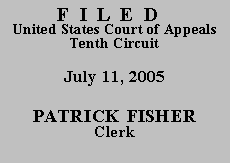 UNITED STATES COURT OF APPEALS
UNITED STATES COURT OF APPEALS
 UNITED STATES COURT OF APPEALS
UNITED STATES COURT OF APPEALS
| UNITED STATES OF AMERICA,
Plaintiff-Appellee, v. GUADALUPE GONZALEZ, Defendant-Appellant. |
(Nos. CIV-05-81-S and CR-99-00040-003-S) |
APPEALABILITY
On May 20, 1999, Gonzalez pled guilty in federal court to a one-count indictment and, on September 1, 1999, was sentenced to 135 months' incarceration. He did not directly appeal either his conviction or sentence. On February 22, 2005, he filed an initial § 2255 motion seeking to vacate his sentence on the ground that it was imposed in violation of United States v. Booker, 125 S.Ct. 738 (2005). The district court dismissed the action, finding that Gonzalez filed his action outside the limitations period established by § 2255, and denied Gonzalez's request for a COA. Gonzalez seeks a COA before this court, arguing that his habeas petition was timely filed and attempting to challenge his sentence under Booker.(1)
A petitioner may file a § 2255 motion within one year of "the date on which the judgment of conviction becomes final." § 2255. It is undisputed that Gonzalez filed his habeas petition well over a year after his judgment of conviction became final. He argues, however, that his petition is timely because it has been filed within one year of "the date on which the right asserted was initially recognized by the Supreme Court," and that the "right has been newly recognized by the Supreme Court and made retroactively applicable to cases on collateral review." Id. The right claimed arises out of Booker. However, we have recently held that "Booker does not apply retroactively on collateral review." Bellamy v. United States, 04-5145, 2005 WL 1406176, F.3d (10th Cir. June 16, 2005). Therefore, we agree with the district court that Gonzalez has filed his petition outside the limitations period and DENY the application for COA and DISMISS.
ENTERED FOR THE COURT
Carlos F. Lucero
Circuit Judge
1. Gonzalez's petition was filed after April 24, 1996, the effective date of the Antiterrorism and Effective Death Penalty Act ("AEDPA"); as a result, AEDPA's provisions apply to this case. See Rogers v. Gibson, 173 F.3d 1278, 1282 n.1 (10th Cir. 1999) (citing Lindh v. Murphy, 521 U.S. 320 (1997)). AEDPA conditions a petitioner's right to appeal a denial of habeas relief under § 2254 upon a grant of a COA. 28 U.S.C. § 2253(c)(1)(A). A COA may be issued "only if the applicant has made a substantial showing of the denial of a constitutional right." § 2253(c)(2). This requires Gonzalez to show "that reasonable jurists could debate whether (or, for that matter, agree that) the petition should have been resolved in a different manner or that the issues presented were adequate to deserve encouragement to proceed further." Slack v. McDaniel, 529 U.S. 473, 484 (2000) (quotations omitted). Because the district court denied Gonzalez a COA, he may not appeal the district court's decision absent a grant of COA by this court.